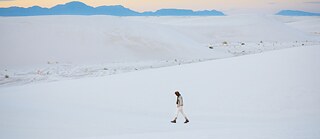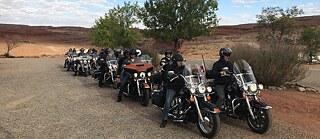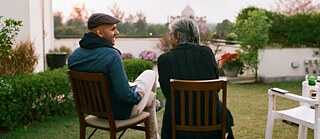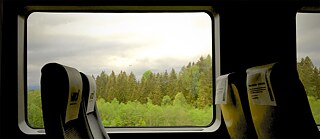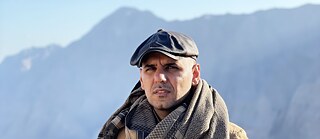Klangliches Fernweh
Radio Wanderlust
Bilal Qureshi widmet sich der auch im Englischen bekannten ‚Wanderlust‘ – in Gesprächen mit Gleichgesinnten und mittels seines persönlichen Klang-Archivs. Wie zeitgemäß ist dieses leicht romantische Konzept überhaupt noch?
Diese Folge anhören: Apple Music | Spotify | Download
Diese Folge stammt von Bilal Qureshi. Bilal ist Radiojournalist, Kulturautor und war 2011 als Stipendiat der Robert Bosch Stiftung für ein Jahr in Berlin. Seine Arbeiten wurden bereits auf NPR, in der „The New York Times“, der „The Washington Post“, „Newsweek“ und „Film Quarterly“ veröffentlicht. Für diese Episode unterhält sich Bilal mit geliebten Menschen und durchforstet seine privaten Audio-Reiseberichte. Das Foto dieser Folge stammt von Yassine El Mansouri und Zebunissa Bangash gab uns die Erlaubnis, ihr Lied „Paimona“ zu verwenden. Außer „Radio Wanderlust“ hat Bilal bereits die Folgen „Black Art, Berlin Stories — Looking for Alain Locke“, „Quietude — In Search of Radio Silence“ und „In Friendship“ produziert. „Quietude“ und „In Friendship“ sind darüber hinaus auch auf Deutsch verfügbar. Mit „Goethe Aktuell“ sprach Bilal Qureshi über die Entstehung seiner Folgen für THE BIG PONDER. Das komplette Interview ist hier zu lesen.
Transkript
Bilal Qureshi: Welcome to Radio Wanderlust. My name is Bilal Qureshi. I’ll be your host and your guide today.
[INDIAN FLUTE]
Oliver Brod [IN GERMAN]: “Wanderlust beschreibt die Lust am Wandern …” Wanderlust is a strong desire to wander or travel and explore the world. The term originates from the German word — Wandern, to hike — and Lust, Desire.
Bilal Qureshi: A small note begin we begin … this is not a guide on how to 36 hours in a city or where to go. But instead this is an exploration of the whys of travel. Why some of us always lust for elsewhere.
Let’s begin with the first stop on today’s journey: my computer speakers.
[MUSIC FADES INTO COMPUTER COMPRESSION]
Bilal Qureshi: Six years ago, I began supplementing my photo albums of past travels with a different kind of archive — a library of sounds of places I’ve seen and loved and recorded.
[CALL TO PRAYER]
Bilal Qureshi: This is dawn in the Indian city of Agra. We’re hearing layers of prayers from the mosques that surround the famous Taj Mahal — the mausoleum garden built by the Emperor Shah Jahan for his deceased wife, its perfect white dome sparkling under a full moon in the distance … a monument to love and to my own Wanderlust.
When a few weeks of working at my computer desk have passed, when the uncomfortable feeling of being stuck in place begins to sting … a delicious restlessness creeps in … and I open this folder.
[RICKSHAW SOUNDS]
Bilal Qureshi: When I open my sound libraries, I can return to the road in Rajasthan, the desert state of India, and a rickshaw snaking up the corkscrew turns on a hill up to a beautiful garden palace where folk musicians sing songs of devotion in the shadows of an ancient fortress.
[RAJASTHANI SINGING CROSSFADES INTO SPANISH GUITAR]
Bilal Qureshi: I am back in Granada, Spain — with street musicians singing in the shadow of the majestic fortress palace of the Al-Hambra, where fountains still flow through its perfumed orange gardens from which the Moors were once exiled by Isabel and Ferdinand.
[AL-HAMBRA FOUNTAINS CROSSFADE INTO SPANISH SINGING]
Bilal Qureshi: Or I can return to the rushing waterfalls of Weimar and to the Goethe Park … tucked into the green rolling hills of the city of Weimar in Germany.
Bilal Qureshi: So what are we looking at right now?
Unidentified Guide: We are here looking at Goethe’s Garden House. It has got a wood roof and many windows, and this is what the people always thought, this is how a German house should look like … here’s the river.
Bilal Qureshi: Is there a lot of tourism in Weimar?
Unidentified Guide: Absolutely. Even in GDR times, Weimar was a popular city for tourists.
[WALKING AND BIRDS]
Bilal Qureshi: In listening, I’m simply trying to soothe what feels like an ache for elsewhere.
And as with many things, German has multiple words for the sickness.
Oliver Brod: [IN GERMAN] ‘Fernweh’ beschreibt die menschliche Sehnsucht ...
[VOICEOVER] In modern German, the use of the word Wanderlust to mean desire to travel is less common, having been replaced by ‘Fernweh,’ literally farsickness, coined as the antonym to ‘Heimweh,’ homesickness.
Bilal Qureshi: Douglas Williams is an American opera singer living in Berlin …
Douglas Williams: German does have these words that we don’t quite have in English to talk about the idea that you’re pained actually … pained by this … I mean Weh is pain or a soreness that you’re ... you miss something so deeply and with such burning desire that it has wounded you actually.
Bilal Qureshi: The English writer Oliver Broom decided to satiate his own Wanderlust by leaving his London job a decade ago and biking across the world. He acknowledges that many saw his condition as a malady, definitely as a sickness.
Oli Broom: You know, you tell enough people you want to go off and have an amazing adventure on a bicycle and enough of them say, oh you’re just looking to escape and that sort of … those seeds of negativity I suppose creep in. But then enough people say oh go for it, that’s going to be an amazing, once-in-a lifetime adventure. So I think Wanderlust does have … there’s a hint of negativity in it, isn’t there?
Bilal Qureshi: The words Wanderlust and ‘Fernweh’ aren’t exactly about wanting to take beach holidays or museums and the latest restaurants. They’re words that express that almost crippling desire to disappear in the expanse of somewhere else.
[OCEAN WAVES]
Bilal Qureshi: An urge that often originates in our own personal history and the history of our desires. For travel writer Gisela Williams, that desire began quite early in life.
Gisela Williams: When I was young, I actually instead of playing doctor, nurse, and you know cowboys and Indians, I played travel agent. I literally went to the local …
Bilal Qureshi: You were a travel agent, like a make-believe travel agent? [LAUGHS]
Gisela Williams: I went to the local travel agency like in my town, and I took all the brochures Icould get my hands on, and I would just pretend like I was going on all these trips.
Bilal Qureshi: One of the things I always remember about talking to you given that you’ve written so much about travel and inspired so many people’s travels is that you said that you just can’t stop.
Gisela Williams: Well, I think that’s true of a lot of people who love to travel … the more you travel, the more you want to travel, the more places you realize that you haven’t seen.
[GNAWA MUSIC]
Bilal Qureshi: Gisela Williams has written a lot about one of my favorite countries, Morocco. What you’re hearing here is the Gnawa music and the lush marketplaces of city of Essaouira on the Atlantic Coast of Morocco.
[MUSIC]
Bilal Qureshi: My childhood hero was a great and mythical traveler from Islamic history named Ibn Batutta. He was a writer who set sail from Tangier, traveling 75,000 miles and writing what is still considered the longest travelogue in history. He traveled from Morocco to China in the fourteenth century, spending most of his life at sea and eventually returning to Morocco many decades later.
[MUSIC]
Bilal Qureshi: But the cartography of Wanderlust — as with lust in general — is profoundly different for each of us. I reached out to several writers and artists who travel professionally to ask them about the places they lust for when they’re not working, where they dream of wandering in the silence of their homes.
[WINTER FOREST SOUNDS]
Bilal Qureshi: For Washington Post books editor Stephanie Merry, it’s a longing for a remote part of Montana … as far from the newsroom as possible.
Stephanie Merry: When you first started talking about this, I immediately was flashing to this deep, deep longing that I’ve had recently to go cross-country skiing.
[CROSS-COUNTRY SKIING SOUNDS]
Bilal Qureshi: I can almost be there in my imagination. I can hear the snow sort of wafting past and that sort of like gentle shifting in the atmosphere as the snow falls … and I just keep thinking about it, and I just can’t wait to be able to do it again.
For Berlin-based screenwriter Anna Winger, who co-created the award-winning show Unorthodox, Wanderlust is sitting in the warmth of southern sun.
Anna Winger: You know I lived in a place in Mexico growing up called Cuernavaca, which was famous for having eternal spring, and it was always 72 degrees and sunny and there’d be like a couple of fluffy clouds and a blue sky … and I just love that kind of weather. And dappled sunlight is like when you’re under a tree and a palm frond and there’s bright sunlight is being cut by shade, that’s like my perfect place. That’s my happy place.
[BIRDS AND RAINS]
Bilal Qureshi: For English writer and travel guide Oliver Broom, it’s memories of his epic cycling trip across the deserts of Africa and Australia.
Oliver Broom: I’m looking out the window now and I can see driving rain, and it’s pretty cold. Nowhere could be more different than the deserts of Sudan. So I often find myself wanting to go back to Sudan, likewise the Australian outback I pine for a lot. My son asked me today, Reggie, asked me “daddy one day can we go to the Outback?” I was just absolutely overjoyed, because his mother doesn’t want to go because she’s scared of spiders, but now I’ve got Reggie on side and maybe we’ll make it out there one day.
[FADE IN BANGKOK STREET SOUNDS]
Janan Ganesh: I’m Janan Ganesh, and I’m a columnist for the FT (Financial Times) and the FT Weekend based in Washington DC.
[STREET SOUNDS CONTINUE]
Janan Ganesh: Whenever I land in Singapore or Bangkok or Jakarta or KL, as soon as I step out of the hotel, I’m just overwhelmed by the energy, and I imagine it’s what it would have been like being in Victorian London or New York in the 1920s before those places had the chance to become so rich for so long that they became a little bit jaundiced about the whole thing. And so if I look at a map of the world and try and throw a dart at the place I’m most excited about visiting, it would be Southeast Asia and East Asia.
Bilal Qureshi: For opera singer Douglas Williams, it’s as far from the city and urbanity as possible — longing for memories of the childhood forests, rivers and valleys of his native Connecticut.
Douglas Williams: Well one of the great American composers happens to be from Danbury, Connecticut and that is Charles Ives and actually there is a song “Tom sails Away,” one of his best known songs. that begins … [SINGING] “scenes from my childhood are floating before my eyes”and then the song goes on to describe … he’s in the house where he grew up, in the garden behind the house. The lettuce rows are growing green, and for me when I hear this song, I’m in my grandparents’ backyard and it’s Spring, it’s Easter time and there are no leaves on the trees yet, but everything is pulsing with that green potential of early Spring just before nature fully explodes.
[STREET CELLIST]
Bilal Qureshi: Douglas Williams is an opera singer and performs regularly from the German repertoire on international stages. He says music has always been a bridge to the longing for elsewhere.
Douglas Williams: Well I think certainly the German Romantics throughout all of the song cycles of Schubert, Schumann, even what’s considered the first song cycle “An die ferne Geliebte” by Beethoven, it’s all dealing with this ‘Sehnsucht,’ this longing. Projected over distance and over terrain and so the idea in “An die ferne Geliebte” is all about this, your thoughts and your yearning is traveling out over the landscape. This is appearing all throughout this early German Romantic period.
[STREET CELLIST FADES]
Bilal Qureshi: On that note, let’s revisit the historical origins of the German idea of ‘Wanderlust.’ Wanderlust originated in the romantic period. Beyond Germany, French and British explorers set out on their own Grand Tour of the European continent and North Africa, though sometimes a project as aligned with imperial expansion as personal intellectual development. Of course that kind of wandering was an aristocratic and certainly mostly — almost exclusively — a male experience of walking the woods and shorelines of Europe in search of self-actualization.
Berlin-based screenwriter Anna Winger says Wanderlust today has a completely different meaning.
Anna Winger: When they talked about Wanderlust, meant wandering in the forest behind their house. You know I’m guessing that they weren’t thinking in global terms the way we do now. When I think of Wanderlust, I don’t think about going to another neighborhood in Berlin. I think about going to visit you in the Middle East or going beyond the borders of my known experience.
Janan Ganesh: The other thing about Wanderlust in the German sense is that it always majoredon the rural setting.
Bilal Qureshi: Again, Janan Ganesh of the Financial Times.
Janan Ganesh: And the Casper Friedrich painting idea of what it was to travel, which is that you explore landscape before you explore the city, if you do the city at all. And I think that has very much changed over the past couple of hundred years. If someone now says to you “I’m an international person, I do a lot of traveling, I have Wanderlust” — what you think of immediately is city to city. I go from Rome to Tokyo to Johannesburg to Sydney to LA. I possess the urban landscape wherever it is, on whichever continent.
[AIRPORT ANNOUNCEMENT]
Bilal Qureshi: I mean we’ve only been doing this en masse for about five minutes on the historical timescale of our species’s history, and so the brain is stimulated by it to a phenomenal degree.
[DUBAI AIRPORT ANNOUNCEMENT]
Bilal Qureshi: Over the past decade my own Wanderlust has been focused beyond Europe on the arrivals and departures gate of Dubai International Airport.
[AIRPLANE SOUNDS CONTINUE]
Bilal Qureshi: The Middle Eastern city is a great crossroads between East and West with easy flights to Africa, East Asia, and Europe, which has made modern Wanderlust — and a more global version of Wanderlust — possible.
[ENGINE TAKE-OFF]
Bilal Qureshi: Anna Winger says flying remains an addictive high.
Anna Winger: I still remember when I was very young and first started traveling by myself, how
[AIR FRANCE ANNOUNCEMENT]
Anna Winger: I love that feeling, the fact that the weather was so different, as soon as the planelanded, you were already looking at different kinds of trees — I was flying there from Boston — I just love that feeling.
Bilal Qureshi: Now armed with our phone, we can even record, snapchat, Instagram and broadcast everything and everywhere we’ve been without having to write some treatise on place and self as the older wanderlusting explorers may have.
Again, Anna Winger.
Anna Winger: There’s no subject too boring to document. There’s no meal too boring to take a picture of it. Everybody just photographs everything. The like bug in their hotel room and the meal that they ate for breakfast and the things they didn’t buy in the shop that they wish they had bought. It’s just like everything.
Janan Ganesh: We’ve seen it become a less pretentious activity, travel.
Bilal Qureshi: Again, Janan Ganesh of the Financial Times.
Janan Ganesh: It’s no longer automatically associated with education and the improvement of the self.
Bilal Qureshi: But travel writer Gisela Williams says the age of ‘Instatravel’ — both the physical reach and the immediate digital feeds — well that kind of travel has also caused undeniable environmental and cultural problems.
Gisela Williams: What’s been a big issue over the last few years is just in general the massive footprint, all the carbon you know from all the pollution from the airplanes. So there was obviously a price we were paying for all of this easy access. So no question, I mean if you look at just the profit and the finances behind travel in the past ten years, you’ll see it just became a huge monster for better and for worse.
Bilal Qureshi: Well you know going back to the worse part of it a little bit — you mentioned being a travel agent when you were younger and the feeling of travel that addicts you forever. How does the feeling of Wanderlust, that kind of deep longing to go somewhere else and to be dislocated and displaced, and have your mind blown. How does it sit alongside this kind of ease of travel? Not to contrast them in an explicit way, one is good and one is bad …
Gisela Williams: I didn’t like the ease of travel so much. That wasn’t for me really a heyday I appreciated because to be honest I like the adventure of travel. I like feeling a bit cut off so that you get uncomfortable. The big word in travel over the last year has been transformative. There’s been a lot of talk about transformative travel, which means using travel as a way to improve something about your own life, whether that means learning something new, experiencing something that makes you open up your creative process. It really is about thinking, “does this trip have value?” And although we might have to spend more money for a flight, maybe that’s better, because you might value that trip more. Instead of taking ten trips in one year, maybe you’ll take one that is of great cultural interest and that really makes you learn.
[URDU FADES IN]
Bilal Qureshi: My favorite aunt and one of my favorite travelers — my father’s older sister — died last fall at home in Lahore, Pakistan. We called her Appi. She never had the chance to come visit us in the US, but on trips home to Pakistan I would always go sit by her side because she loved to tell the stories of her own travels.
[URDU DESCRIPTION OF DRIVING]
Bilal Qureshi: In 1978, Appi took a car trip that is physically and politically impossible today. She drove with her three kids from Lahore across Asia and Europe … to London … in a van. The journey took 22 days. And she kept a diary of every detail and everything she saw.
Every time I visited her at home in Lahore, she would read to me from that book. I recorded this reading from one of her favorite entries.
[URDU DESCRIPTIONS OF AFGHANISTAN]
Bilal Qureshi: She’s talking about driving into the majestic landscapes of Afghanistan. Crossing the border from Pakistan through the epic mountain passes that divide the two countries. The piercing eyes and faces of the people and the feeling of arriving in such a different climate and in such a different scent.
Appi had 18 friends on Facebook, and she wasn’t great on FaceTime. But in her extraordinary language and in the observations she recorded, she distilled cultures and geographies into words, images, and sounds that I still revisit ... and she always kept her diary nearby to refresh herself in the wonder of that journey … in her perpetual, incurable Wanderlust.
[SONG - “PAIMONA”]
Bilal Qureshi: The song you’re hearing is a famous Afghan song called “Paimona,” sung by the Pakistani pop star Zebunissa Bangash, whose own family has ancient roots in this part of the world.
Zebunissa Bangash: It’s funny when I finally went to Kabul, and I stood there and I looked at the mountains, I felt oddly moved by the place, very moved by the place, as if this was a place that I’d seen, that I had lived in. I felt like the land of my ancestors. Music has helped me kind of access places. That is the reason why I sing in so many different languages. It is kind of a Wanderlust.
[“PAIMONA” CONTINUES]
Bilal Qureshi: South Asia has a long history of travelers, caravans and a lot of the music evokes place as a kind of spiritual destination. Like the German twin words of ‘Heimweh’ and ‘Fernweh,’ the longing for home also blends into one feeling, a kind of spiritual longing.
I asked Zeb if she wouldn’t mind humming one of those yearning songs for elsewhere.
Zebunissa Bangash: There’s this ‘Raag Des,’ which is actually a scale that is supposed to evoke home. I can sing that for you.
[SINGING]
Bilal Qureshi: Zeb is not singing about a physical place.
Zebunisssa Bangash: Right and it’s interesting that in our part of the world, it’s an imagined space. It’s not just a place. It can be a season. In this, you’re talking about kind of the pre-monsoon ‘Ghata’ coming in — ‘Kari Kari Ghata.’ So I always think of the monsoons.
[SINGING CONTINUES AS RAIN BEGINS]
Bilal Qureshi: Through the thinking of the monsoons, I imagine colors. The very dark tropical greens, like a rubber tree or something, a mango tree.
[SINGING]
Bilal Qureshi: For me, Wanderlust has never been about a place. It’s always just been about finding a certain feeling. It’s about longing for feeling a certain way.
Travel writer Gisela Williams says while we may no longer live in the original world of Wanderlust that the German romantics may have been thinking about, the ideal of leaving and returning, searching and finding, still holds meaning in our lives.
Gisela Williams: This is such a cliché, but my favorite movie as a child was The Wizard of Oz. That was ultimately the theme, right? In the end there’s no place like home, but still she was able to go off somewhere in her imagination. Whether that was actually something literal or not, the point is that she did come back with a whole new set of eyes that allowed her to appreciate where she’s from. But you don’t necessarily have to physically leave. You can also manage to do that through reading or ingesting culture, movies, music. All of that somehow can engage your mind in a way that allows you to journey elsewhere, and then come back.
[DELHI PARAKEETS AND FLUTE FADES IN]
Bilal Qureshi: I’ll conclude with this recording from New Delhi, India. What you’re hearing is the 15th-century Lodhi Gardens where monumental tombs sit in a beautiful, rolling green park. I found this man playing the Indian flute just as the bright green parakeets make their own journey home at sunset, every night. Thank you for joining me for this edition of Radio Wanderlust. I’m Bilal Qureshi.



